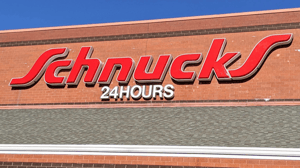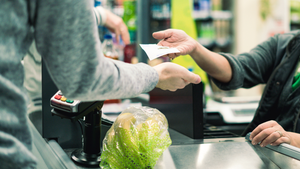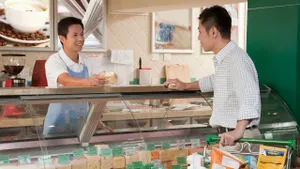Eurofresh Market Beats Recession With Variety
TINLEY PARK, Ill. - Eurofresh Market here gives a lot of credit to its produce and deli departments for keeping sales steady during the worst of the economic downturn. At the independent's largest store, smack in the middle of unprecedented competition, produce brings customers into the store and makes up 22% of store sales, store manager Frank Fortini told SN. We're known for our produce. Our owner
September 27, 2010
ROSEANNE HARPER
TINLEY PARK, Ill. — Eurofresh Market here gives a lot of credit to its produce and deli departments for keeping sales steady during the worst of the economic downturn.
At the independent's largest store, smack in the middle of unprecedented competition, produce brings customers into the store and makes up 22% of store sales, store manager Frank Fortini told SN.
“We're known for our produce. Our owner goes down to [Chicago's] Water Street Market every morning, every day, to choose our produce,” Fortini said.
“We pride ourselves on variety, as well as the highest quality and the freshest [products]. We have to differentiate ourselves in this competitive market,” he added.
“With more than 450 different varieties of produce, we have double what the big chains have. That's just fresh produce, not counting bottled salad dressing or juices or bulk items. We probably have 50 different varieties of potatoes.”
Especially in-season, much of the produce is local, or at least regional, and that complements a huge selection of imports in center store. Thus, the name Eurofresh well describes the offerings at the independent's 62,000-square-foot store here, and at a smaller store in Palatine, Ill.
The dry grocery department houses four and a half full aisles of imports, from Italy, Greece, India, and other parts of the world. Just as an example, there are 20-pound bags of grains from India, as well as a huge variety of oils and vinegars from Italy.
Bulk items from all over the world are big at this store, too.
“We have at least a 100 items that we buy in bulk, such as nuts and trail mixes, dried fruits, and grains. But we package them up in-store in plastic trays with lids.”
While those types of items are usually merchandised in supermarkets' produce departments, Eurofresh officials found they sell better in front of the deli. They're displayed on the knee-high rack where breads also are merchandised.
“They are so much more visible at the deli,” Fortini said. “Once we moved them from produce, their sales went up 20% and we opened up more space in produce for fresh items.
The multi-ethnicity of its marketplace plays a major role in product selection at Eurofresh.
“Within a four-mile radius, there are all different ethnics groups - Asian, Indian, Mexican, South American, and others.”
As a consequence, Eurofresh tailors its produce selections, as well as its dry groceries, to the surrounding population. Items in fresh produce include Indian karella/bitter melon, methi leaves, tindora peppers, Indian eggplant, Thai chili peppers, taro root, and opo squash, as well as Serrano peppers, dikon and baby bok choy.
Recessionary times put Eurofresh on its toes, Fortini said.
In fact, a little over a year ago, the independent's owners and management reconnoitered to see how they could survive in a dim economy when they're surrounded by the likes of, Super Kmart, Aldi, Super Wal-Mart, Food for Less, Meijer, and Jewel stores on three sides.
“We have at least 10 big competitors within two miles. I don't know of any other independent that has such a wall of competition around them,” Fortini told SN.
Instead of cutting back, the company added variety in all departments - especially bringing in more imported beers and wines - and made sure that everything in all departments was kept in stock.
“We watched the shelves closely and we paid a lot of attention to our customers,” Fortini said.
“If customers asked where something was, associates were instructed to walk the customer to the product. That makes people happy.”
Eurofresh did lower prices wherever it made sense, but what was most effective was adding convenience.
“We made aisle breaks, cut the aisles in half to open up the bakery. “
Shorter aisles, too, made shopping easier.
“Customers didn't have to walk a 68-foot aisle anymore, and it gave us more ends for displays. We noticed soon that traffic increased, and sales went up.”
In produce, if a customer didn't know what something was, associates not only told them, but offered them a bite.
“We want to do more sampling and demos there on a regular basis.”
In the deli, just a month ago, the store began packing sides and salads and created a 6-foot self-service display across the aisle from the service deli. They're selling fast from that spot, Fortini said.
The deli, spanning 68 feet, gets a lot of credit for keeping total store sales steady. With a staggering menu of 30 to 40 entrees, many of them ethnic favorites, the deli is a draw.
Even Eurofresh's cold deli kept sales steady. There, associates themselves found convenience in the form of new packaging for bulk meats.
Cryovac's Grip & Tear bags, which Butterball began using early this year, save time, Fortini said.
“There's no fooling around with knives or scissors, taking time, and potentially damaging the product,” he said.
“You just grab two tabs and pull, and the package opens. In an instant, the product is ready for display.”
About the Author
You May Also Like




